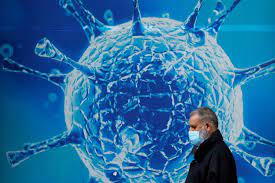What you need to know about the coronavirus right now
Aug 24 (Reuters)
Here’s what you need to know about the coronavirus right now:
Australia pandemic panel backs reopening targets
Australia can proceed with its reopening plans when the country reaches 70%-80% vaccination levels, the government’s pandemic modelling adviser said, even as some states hinted they may not ease border curbs if Sydney fails to control its Delta outbreak.
“This level of vaccination will make it easier to live with the virus, as we do with other viruses such as the flu,” it said in a statement late on Monday. “Once we reach 70% vaccine coverage, opening up at tens or hundreds of cases nationally per day is possible.” Currently, 30% of Australia’s adult population has been fully vaccinated while 53% have had at least one dose.
Researchers working toward one vaccine for many variants
Two separate research teams last week reported on laboratory tests of monoclonal antibodies that appear to protect against a broad range of COVID-19 virus variants. One study, published on Wednesday in The New England Journal of Medicine, identified “high-level, broad-spectrum” antibodies in blood samples from survivors of the original SARS outbreak in 2003 who recently received the Pfizer/BioNTech vaccine against SARS-CoV-2, the virus that causes COVID-19.
In test tube experiments, some of the SARS survivors’ antibodies induced by the vaccine could neutralize not only all of the current SARS-CoV-2 variants of concern, but also five viruses that have been identified in bats and pangolins and that have the potential to cause human infection. The findings from these studies could be a step toward developing new antibodies that would be effective against multiple different coronaviruses, the teams say.
New Zealand has highest jump in cases since April 2020
New Zealand on Tuesday recorded its highest increase in COVID-19 cases since April 2020 at 41 new cases, but authorities said the numbers were not rising exponentially and the majority of the cases were still centred in Auckland where the recent outbreak started.
Prime Minister Jacinda Ardern has garnered global praise for stamping out COVID-19 in the country. But her reliance on strict border controls and snap lockdowns that have impacted the economy has been called into question amid the latest outbreak, which has occurred while few people have been vaccinated.
New York City mandates COVID-19 vaccine for teachers
New York City will require public school teachers and staff to get vaccinated against COVID-19, Mayor Bill de Blasio said on Monday, part of a push to get more residents inoculated and slow the spread of the highly contagious Delta variant.
All 148,000 staff members in the largest U.S. school district must get at least one dose of a vaccine by Sept. 27 as part of the mandate, de Blasio said. In a first for city employees, Department of Education staff will no longer have the option to submit to weekly testing instead.
Infectious virus shedding may be lower in breakthrough cases
Vaccinated people who get infected with COVID-19 have high levels of the virus in their noses and throats but not all of that virus is infectious, a new study suggests. Among 24,706 vaccinated healthcare workers in The Netherlands, 161 developed mild or asymptomatic breakthrough infections, mostly due to the Delta variant of the coronavirus. The viral levels on nose-and-throat swab samples from these patients were just as high as in unvaccinated healthcare workers who were infected last year with the original strain of the virus.
But in test tube experiments, the virus from vaccinated patients was less efficient at reproducing itself than virus from unvaccinated patients, probably because some of it had been neutralized by antibodies from the vaccine, the researchers speculate. In a report posted on medRxiv on Saturday ahead of peer review, they conclude that shedding of infectious virus is reduced in breakthrough cases, although patients are still contagious.












